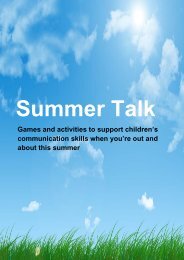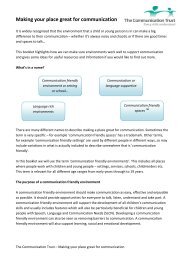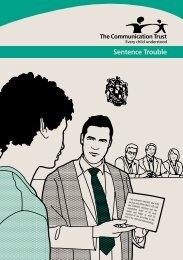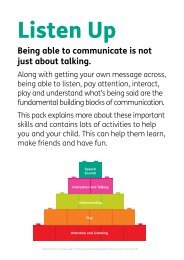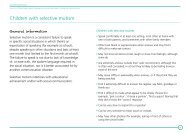Communicating Phonics - The Communication Trust
Communicating Phonics - The Communication Trust
Communicating Phonics - The Communication Trust
You also want an ePaper? Increase the reach of your titles
YUMPU automatically turns print PDFs into web optimized ePapers that Google loves.
<strong>Communicating</strong> <strong>Phonics</strong>Section 4 > Different types of speech, language and communication needs > Children with auditory processing disorder or CAPDChildren with auditory processing difficultiesAlso known as central auditory processing disorder or CAPDGeneral informationCentral Auditory Processing Disorder (CAPD) orAuditory Processing Disorder (APD) is an inabilityto process what’s being heard. It describes a varietyof problems with the brain that interfere with theprocessing of auditory information. <strong>The</strong> causes of thisdifficulty are often not known.Helping to access the phonics screening checkPossible issuesChildren with CAPD or APD canoften have typical understandingof language and be able tounderstand the instructions. Thisshould be checked with the childWays to helpA child with CAPD or APD maybe very easily distracted and willstruggle in a noisy environmentChildren with CAPD or APD:• Will often pass hearing checks but may mis-hear andtherefore not understand spoken language. <strong>The</strong>re is aproblem with the way that the messages are passed to thepart of the brain that controls making sense of what we hear• Will have difficulty in hearing the difference between similarsounding speech sounds or words and this may affect theiruse of these sounds or words in their own speech• Are usually just as intelligent as other children their age buttypically have low academic performanceCAPD or APD is hard to diagnose and may co-exist with otherconditions such as specific language impairment, attentiondeficit disorder, attention deficit hyperactivity disorder orlearning difficulties<strong>The</strong> check will need to take placein a quiet, distraction free areaChildren may need extra time toprocess what they have heard<strong>The</strong> adult should make sure theyhave the child’s full attentionbefore giving each item on thephonics screening check. If thechild’s attention span requiresit, administer the checklist overmore than one session<strong>The</strong>y should not be subject to atime constraint32




